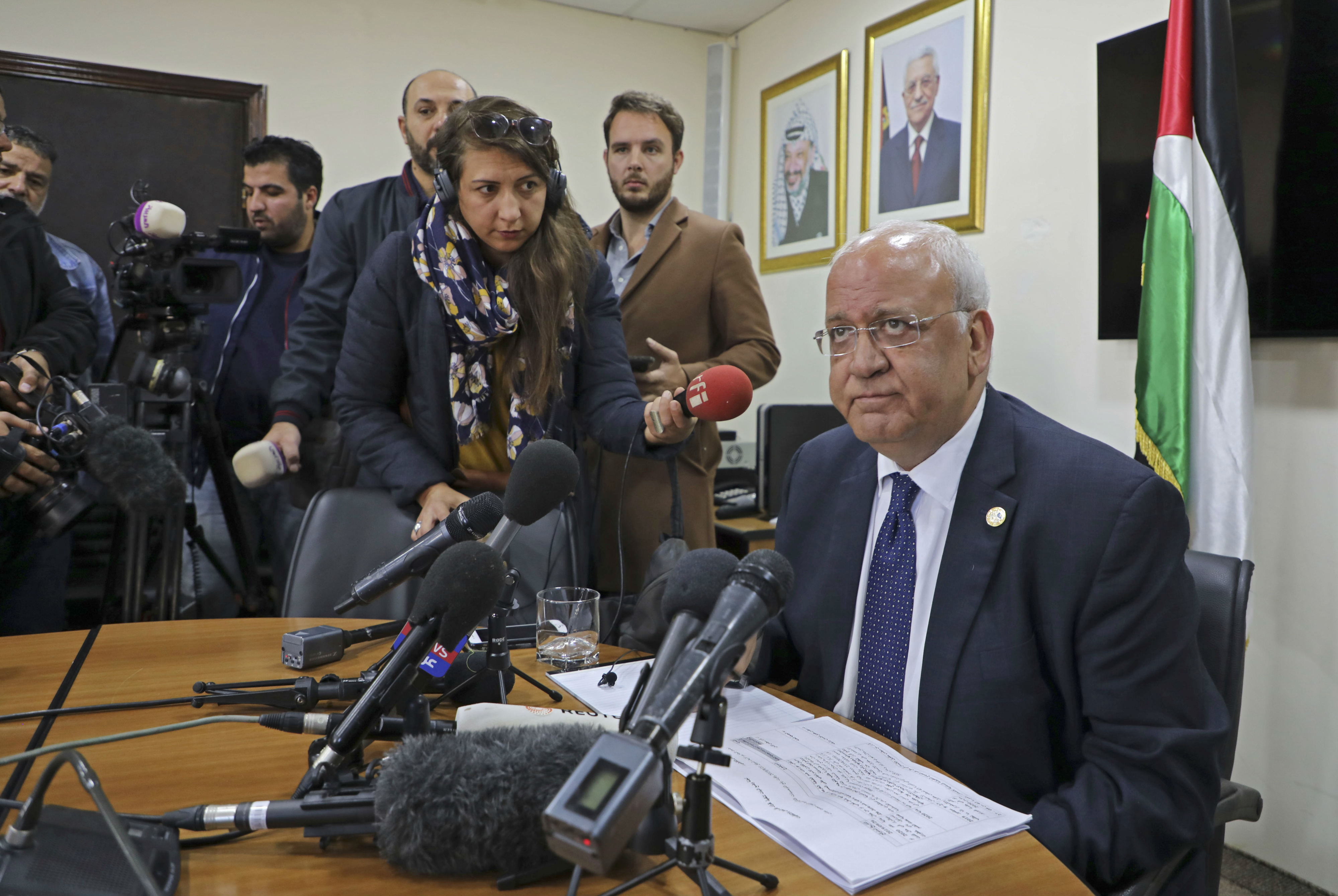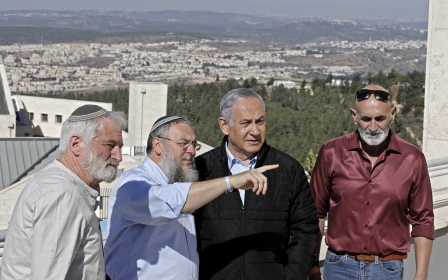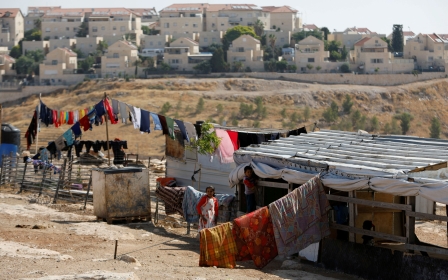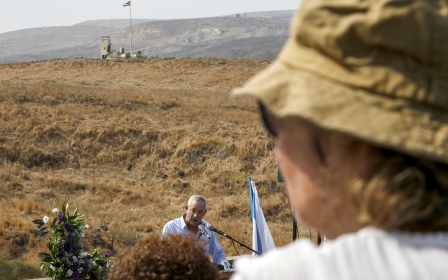'No legal validity': Palestinian leaders dismiss US settlement position
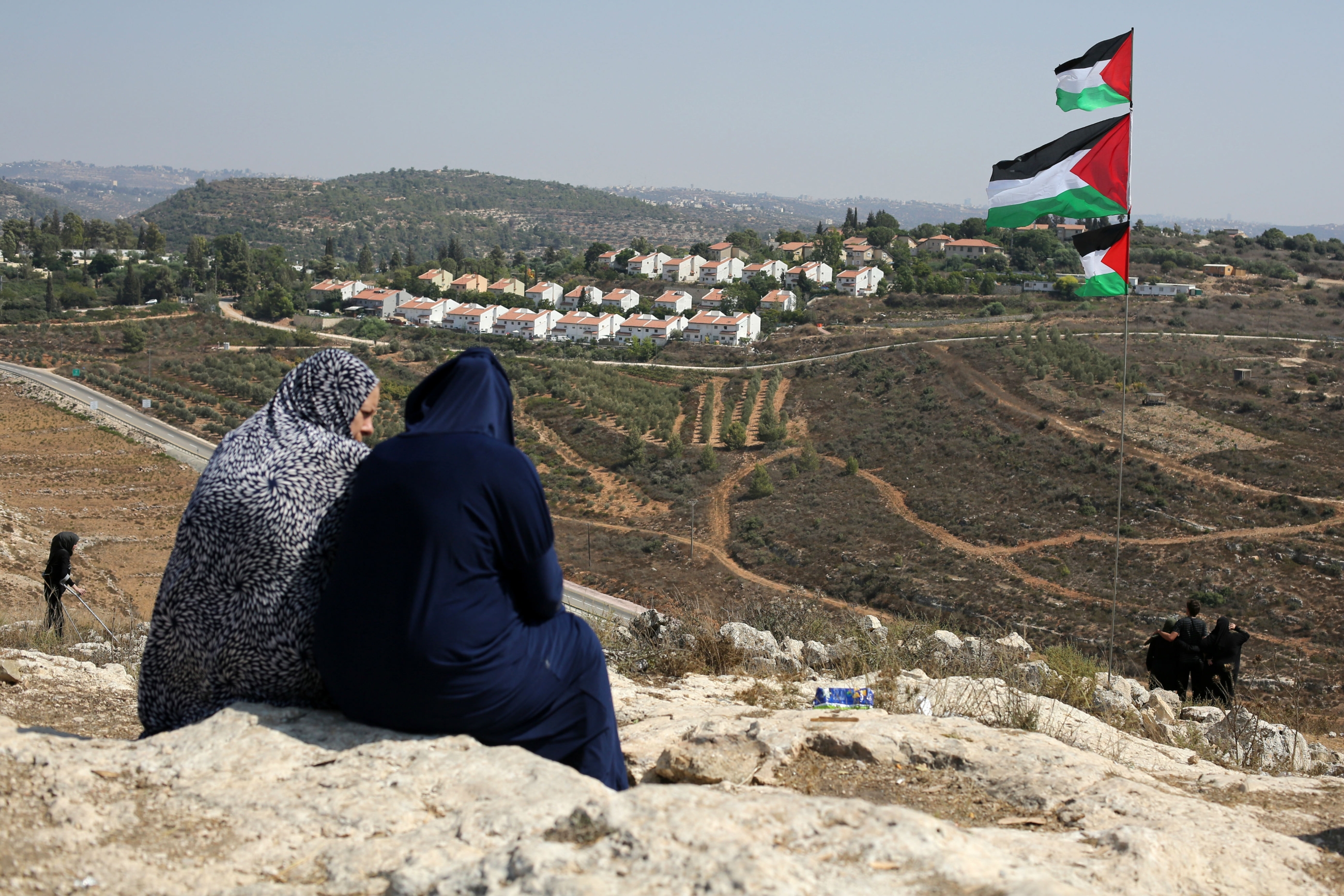
President Donald Trump and his secretary of state may believe that Israel’s rampant settlements in the West Bank are perfectly legal, but their wishes are immaterial in the face of international law, top Palestinian leaders have told Middle East Eye.
Instead, they say, the United States has merely excluded itself from any role bringing Israelis and Palestinians together, isolating itself on the international scene.
“This will not legalise the occupation and the Israeli settlements, but rather will end the American role in any peace process,” Saeb Erekat, chief Palestinian negotiator, told MEE.
'The Trump administration’s policy here is not only threatening the prospect for Israeli-Palestinian peace, it is absolutely killing it'
- Saeb Erekat
“We will stand tall on the tenets of international law, shoulder to shoulder with all nations on earth because the Trump administration’s policy here is not only threatening the prospect for Israeli-Palestinian peace, it is absolutely killing it.”
Palestinian officials were left scrambling on Tuesday after US Secretary of State Mike Pompeo said the day before that Washington believes Israel's settlements in the occupied West Bank are not "inconsistent with international law".
New MEE newsletter: Jerusalem Dispatch
Sign up to get the latest insights and analysis on Israel-Palestine, alongside Turkey Unpacked and other MEE newsletters
Built on land occupied in the 1967 Middle East war, Israeli settlements are illegal under the Geneva Convention, which the US is a signatory of.
The move was just the latest in a long line of decisions undermining the Palestinians in the face of aggressive Israeli expansion. Shorn of ways to effectively resist Trump’s attacks, the Palestinian Authority (PA) is left seeking support abroad.
According to Erekat, the PA will now take several steps to combat the US announcement.
First, he said, it will call for an emergency summit of Arab foreign ministers. Second, the Palestinians will turn to the United Nations Security Council.
“Let the world see a veto. Let the world see that someone in the Security Council, which is supposed to protect peace, international law, security and order, is violating international law,” he said.
Then the PA will turn to the UN General Assembly, the International Criminal Court and the Human Rights Council, Erekat vowed.
“We will seek to build a world alliance on the base of international law,” he said.
'Perverse ideological leanings'
Hanan Ashrawi, a member of the Palestine Liberation Organisation’s executive committee, echoed Erekat’s sentiments.
“The announcement made by US secretary of state has no legal validity,” she told Middle East Eye.
Under the Fourth Geneva Convention, an occupying power cannot move its civilian population into territory it occupies.
Since capturing the West Bank and East Jerusalem, Israel has built some 200 settlements. Currently, around 400,000 Israelis live in the West Bank, alongside nearly three million Palestinians.
Trump's gifts to Israel
+ Show - HideThe Trump administration's bombshell announcement that it no longer considers Israeli settlements in the occupied West Bank illegal under international law has sent shockwaves through the region.
But it's only the latest in a long line of unilateral gifts offered by Donald Trump to Israel since the president took up residence in the White House in January 2017.
Middle East Eye takes a look at how Trump has promoted Israeli interests at the expense of the Palestinians:
Pro-Israel aides: Friedman, Kushner and Greenblatt
From the first moment Trump stepped in the Oval Office he appointed a raft of aides with close ties to Israel and the settlement movement.
Two of the first, and most prominent, tasked with dealing with the Israel-Palestine conflict were Jared Kushner, his son-in-law, and Jason Greenblatt, his personal lawyer.
Kushner and Greenblatt have been heavily involved in the so-called "deal of the century" peace plan, however their loyalties are heavily weighed in Israel's favour.
Kushner's family are close friends of Israeli Prime Minister Benjamin Netanyahu, and donated money to settlement organisations.
As Middle East envoy, Greenblatt, meanwhile, has consistently defended Israeli actions against Palestinians.
David Friedman, US ambassador to Israel, has been the Israelis' chief cheerleader since taking office in May 2017, telling the New York Times that “under certain circumstances, I think Israel has the right to retain some, but unlikely all, of the West Bank".
In July, Friedman and Greenblatt opened a highly controversial tunnel under the Palestinian neighbourhood of Silwan in occupied East Jerusalem.
The US ambassador was seen taking a hammer to a wall in the ancient archaeological site with particular zeal, in an event organised by settler group ELAD.
Recognising Jerusalem as Israel's capital
In a clear sign that Washington was prepared to upend years of convention and consensus in Israel's favour, Trump announced in December 2018 that the United States recognised Jerusalem as the Israeli capital.
East Jerusalem has been occupied since the 1967 Middle East war, and the Palestinians seek it as their capital of any future state.
The international community has maintained that Jerusalem's status must be agreed upon in a settlement between the Israelis and Palestinians, and in response to Trump's move 128 states condemned the decision in a UN General Assembly vote.
On 14 May 2018 - the 70th anniversary of Israel's founding - the US officially moved its embassy from Tel Aviv to Jerusalem.
Demonstrations erupted in the Gaza Strip and the West Bank, with Israeli forces killing at least 57 Palestinians as Kushner and his wife Ivanka Trump grinned at the embassy's opening.
Cutting funds for UNRWA
In early 2019, the US cut all funding to the UN agency that supports Palestinian refugees, UNRWA, saying its business model and fiscal practices were of an "irredeemably flawed operation".
UNRWA provides services to about five million Palestinian refugees, with the US a significant donor since the agency's founding following the 1948 creation of Israel.
In 2018, Washington gave UNRWA $125m in aid, and the agency has scrambled to make up for the sudden shortage.
The Golan Heights
In another unilateral decision, Trump in March announced that the US recognised Israeli sovereignty over the occupied Golan Heights.
The Golan was captured from Syria in 1967 and is both highly strategic and resource-rich. The majority of its inhabitants are Syrian Druze, who largely refuse to engage with Israeli rule.
Some 20,000 illegal Israeli settlers also live on the plateau.
Trump's decree was a gift to Israeli Prime Minister Benjamin Netanyahu ahead of the April elections, and was signed in his presence alongside Friedman, Greenblatt and Kushner.
For 40 years, the United States has maintained that Israeli settlements violate international law, following a 1978 State Department legal opinion drawn up by legal adviser Herbert Hansell.
On Monday, however, Pompeo said: "The establishment of Israeli civilian settlements is not, per se, inconsistent with international law."
This unilateral change in opinion was dismissed by Ashrawi.
“The US neither has the right nor agency to rewrite international law and deface the rules-based international order based on its perverse ideological leanings,” she said.
“Israeli settlements are a grave violation of international law, including international humanitarian law. They also constitute a war crime according to the Rome Statute. These are solid facts that the Trump administration cannot alter or unravel.”
For Ashrawi, the Trump administration is “a threat the international community must confront with consistency and moral clarity”.
Two-state dilemma
Israel’s settlements have been a major obstacle to peace, and their ever-expanding number has posed serious questions over the validity of a Palestinian state in the West Bank.
Some, including many Palestinians, have called for a rethink and said that the world is faced with a one-state reality.
For Nasser Qidweh, member of Fatah’s central committee, there can be no other option.
“The immediate result of leaving the two-state solution and adopting the one-state solution is legalising the Jewish settlements on our land,” he told MEE.
Qidweh said rather than securing Palestinians the rights that Israelis hold, folding Israel and the West Bank into one state would just encourage Jewish settlement and maintain oppression.
'The immediate result of leaving the two-state solution and adopting the one-state solution is legalizing the Jewish settlements on our land'
- Nasser Qidweh, Fatah
“We have the experience of the Palestinians in Israel, who are being discriminated against in all aspect of their lives and their very existence,” he said.
Speaking to MEE on condition of anonymity, one of the top Palestinian leaders said the majority of the world supports the two-state solution, therefore so should the Palestinians.
“Talking about one state would only give legitimacy to the settlements,” he said.
Questions, too, will now be asked about the future of the Palestinian Authority, which has since the 1990s Oslo Accords failed to secure peace or protect the West Bank from Israeli colonisation.
Such talk was outright rejected by the Palestinian leader, who maintained that the new US position must be fought against, and that capitulation was not an option.
“It is impossible to dissolve the PA. Instead, we must confront the United States and not turn away from the decision,” he said.
Middle East Eye delivers independent and unrivalled coverage and analysis of the Middle East, North Africa and beyond. To learn more about republishing this content and the associated fees, please fill out this form. More about MEE can be found here.


